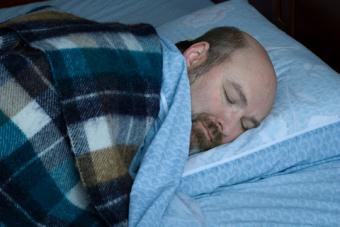
Sleep maintenance insomnia is a condition in which an individual has little to no trouble falling asleep, but wakes up in the middle of the night, unable to fall back to sleep. This highly treatable form of insomnia is one of the least diagnosed sleep disorders.
What Is Sleep Maintenance Insomnia
You go to sleep at night without too much trouble. In the middle of the night, you awake on your own. No noise disturbed you and no one woke you. You cannot seem to get back to sleep. For some, it could be hours before you can get back to sleep, if at all. This is what generally happens for individuals suffering from this condition.
Causes
There are many reasons this could be happening. For some, it is simply a bad night's sleep due to their surroundings. If it occurs more than one or two times per week, this may be an indication of a more serious sleep disorder including severe insomnia.
- Stress and Depression: A leading cause for this form of insomnia is stress. Stress affects sleep in numerous ways, but in particular, it may disturb the sleep cycle during REM sleep. This can lead to fully awakening in the middle of the night, unable to go back to sleep.
- Sleep Apnea: Individuals who suffer from sleep apnea are more likely to suffer from insomnia related problems, including the sleep maintenance form. Sleep apnea causes the brain to jar an individual awake just enough to reopen the closed airway. If jarred awake too much, or too often, this may lead to insomnia symptoms.
- Restless Legs Syndrome: Restless legs syndrome is painful and stops many from sleeping well. It can lead to insomnia problems if it becomes severe or flare-ups happen in the middle of the night regularly.
- Bimodal sleep patterns are natural sleep rhythms that follow a cycle of sleeping, followed by waking for awhile before falling back asleep.
Treatment Options
It is possible to treat this condition yourself. If it becomes severe, such as happening more than one or two times per week, speak with a family doctor or sleep specialist. A sleep study may be necessary to diagnose the problem and provide medication treatments.

- Exercise: Exercising during the day can help your body to be naturally tired during the night. This will help you to remain asleep longer and get a deeper quality of sleep.
- Bedtime Routine: Your bedtime routine should be as close to the same each night as possible. Try a warm bath, soothing music, gentle yoga. Do not read engaging books or watch television since these are stimulants. Also, try to go to sleep at the same time each day. Wake up at the same time each day. This improves overall sleep ability.
- Eat Properly: Avoid stimulating foods in the three hours prior to bedtime. This includes caffeine, alcohol, tobacco and sugary foods. Try to keep caffeine out of your system after lunchtime.
If you do wake up during the night, try to relax your mind to fall back asleep. Refrain from thinking about things that cause anxiety or stress. If you cannot get back to sleep after 20 minutes of trying, move to a different room. You may need to do something soothing to help you to fall asleep, such as listening to soft music or stretching. Avoid long periods in your bed while feeling distressed. You want your mind to see your bed as a place just for sleep.
You may wish to take over the counter sleep aids. While some people may have good results from taking these products, others do not. If you find that none of the above methods of treating sleep maintenance insomnia work for you, consult your family doctor prior to taking over the counter sleep medications. Your doctor may offer prescription strength, non-addictive medications that can be effective.
For long term problems, consult a sleep specialist. In some situations, hormonal imbalances or other sleep disorders can trigger this form of insomnia. Speak with your doctor about any potential triggers, such as stress or health ailments.







